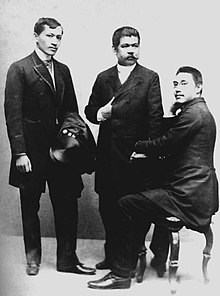Mariano Ponce
| Mariano Ponce | |
|---|---|

Jose Rizal(left), Marcelo del Pilar (middle), Mariano Ponce (right)
|
|
| Born |
March 23, 1863 Baliwag, Captaincy General of the Philippines |
| Died | May 23, 1918 (aged 55) Sai Ying Pun Community Complex, British Hong Kong |
| Nationality | Filipino |
| Other names | Naning, Kalipulako, Tikbalang |
| Known for | Philippine Revolution |
| Political party | Nacionalista |
Mariano Ponce (March 23, 1863 – May 23, 1918), was a Filipino physician, writer, and active member of the Propaganda Movement. In Spain, he was among the founders of La Solidaridad and Asociacion Hispano-Filipino. Among his significant works was Efemerides Filipinas, a column on historical events in the Philippines which appeared in La Oceania Española (1892–1893) and El Ideal (1911–1912). He wrote Ang Wika at Lahi (1917), a discussion on the importance of a national language. He served as Bulacan's representative to the Philippine Assembly.
Ponce was born in Baliwag, Bulacan where he completed his primary education. He later enrolled at the Colegio de San Juan de Letran and took up medicine at the University of Santo Tomas. In 1881, he traveled to Spain to continue his medical studies at the Unversidad Central de Madrid.
There he joined Marcelo del Pilar, Graciano López Jaena, José Rizal and other Propagandists in an anti-Spaniard movement. This espoused Filipino representation in the Spanish Cortes and reforms in the Spanish colonial authorities of the Philippines. He was the co-founder of La Solidaridad with fellow co-founder Graciano López Jaena. Ponce was also the head of the Literary Section of the Asociacion Hispano-Filipina, created to aid the Propaganda Movement where he served as secretary.
In La Solidaridad, his works included daily editorials on history, politics, sociology and travel. He also created himself many alias as well. His most common names are Naning, his nickname; Kalipulako, named after Lapu-Lapu; and Tigbalang, a supernatural being in Filipino folklore.
...
Wikipedia
